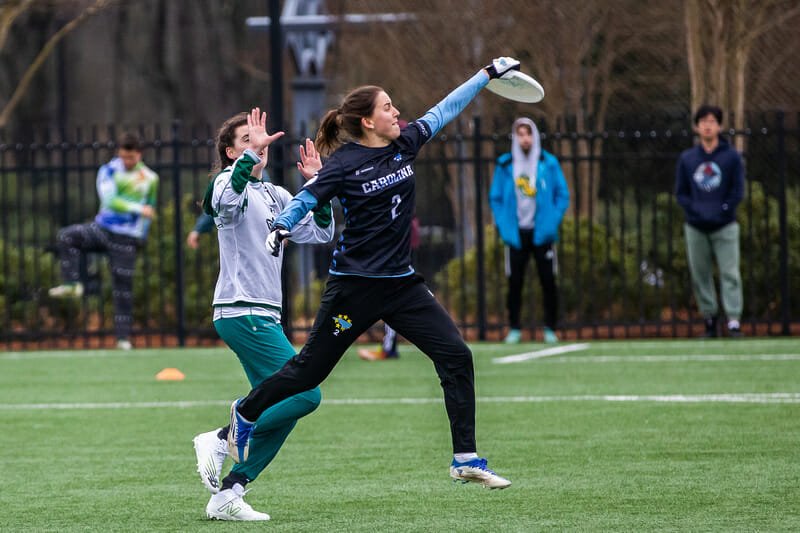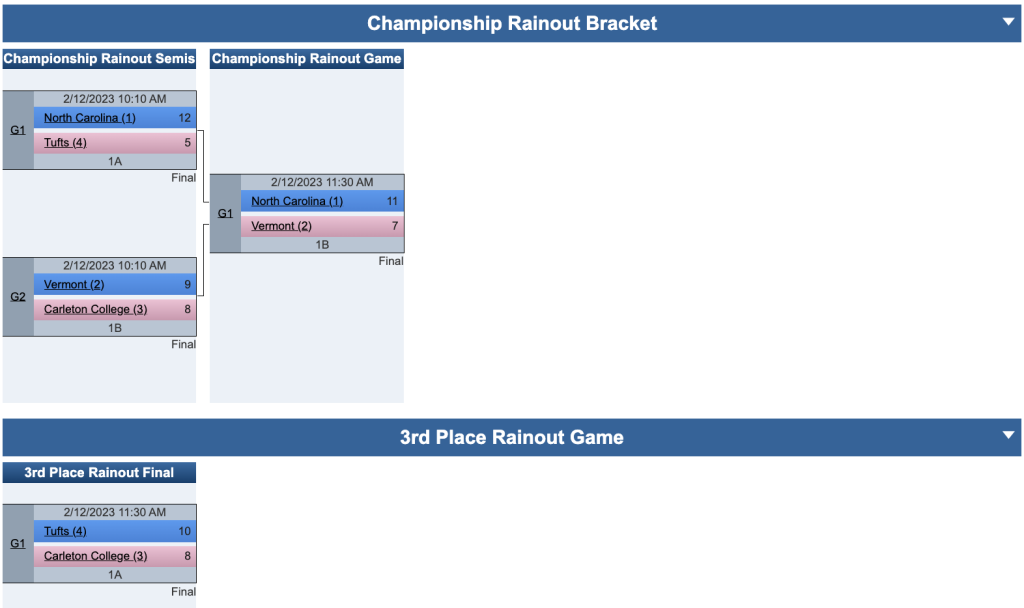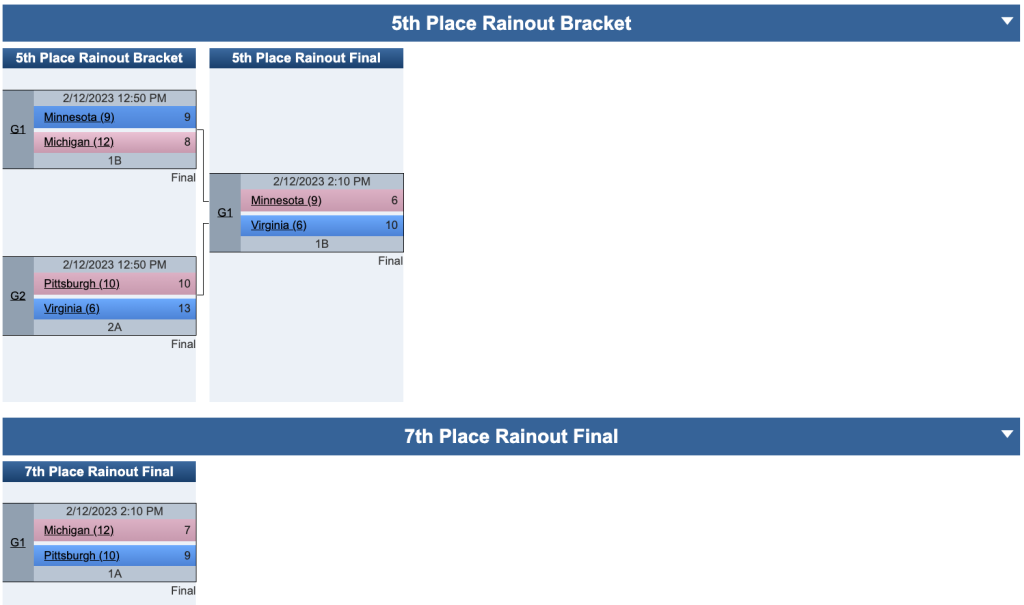Four teams stood above the rest.
February 15, 2023 by Bridget Mizener in Recap with 0 comments

Ultiworld’s coverage of the 2023 college ultimate season is presented by Spin Ultimate; all opinions are those of the author(s). Find out how Spin can get you, and your team, looking your best this season.
ROCK HILL, S.C. — 13 ranked teams, including some of the division’s elite, descended on Rock Hill to brave the predictably disagreeable conditions at the Queen City Tune Up. The bracket was condensed due to weather, but neither rain nor cold nor WFDF cap rules could stop #1 North Carolina Pleiades from taking home the QCTU crown with an 11-7 victory over #4 Vermont Ruckus in the final.
Teams played a two-game bracket based on their Saturday results—fortunately there was no complicated math required in the championship bracket, as the top seeds comfortably went undefeated in their respective pools.
Just because the favorites rolled and UNC prevailed doesn’t mean it was all chalk this weekend; some teams impressed, some failed to meet expectations, and some questions are still unanswered.
Final Results


The Best vs. the Rest
Of the 40 games that were played in pool play, only 12 were decided by a margin of less than four goals. The top four seeds — UNC, Vermont, Carleton, and Tufts — played none of those games. In fact, they played no pool play games that were decided by less than six.
The closest game that one of the “big four” played before the bracket was Carleton vs. Virginia at 13-7. Even through the bracket, UNC won all their games by at least four. They were also responsible for the tournament’s largest margin of victory, hanging a 15-0 bagel on William & Mary.
The data confirms what the eye test showed all weekend: these four teams are head and shoulders above the rest of the pack.
North Carolina and Vermont Atop Rock Hill
In a repeat of last year’s QCTU final, it all came down to North Carolina and Vermont. The finalists had similar Saturdays. Though Ruckus had a few closer games in pool play — a 12-5 win against Pittsburgh jumps out on paper — they seemed to be playing their full roster, with offensive centerpiece Kennedy McCarthy only seeing the field sparingly. UNC’s philosophy was similar; they dominated Pool A and used the opportunity to get reps with different personnel combinations.
It was a different story in the final. Both teams pulled out all the stops, showing a variety of defensive looks and crossing over their stars on key points. Big names on both teams — McCarthy, Emily Pozzy, Marina Godley-Fisher on the Vermont side, and Ella Juengst, Alex Barnett, and Dawn Culton for UNC — did not take a backseat in the name of development. This was a game both teams clearly wanted to win.
Though they traded holds until 3-3, the clear takeaway from the game is that both offenses looked far from perfect this early in the season.
Much of Vermont’s offensive flow went something like this: start McCarthy downfield, prioritize getting her the disc on the first or second pass, and then let her cook. Sometimes that was incredibly effective. Other times it was not.
Ruckus struggled most when the rest of their receiving corps drifted too far away from the disc — they were often off-screen on the video coverage of the game. Godley-Fisher often acted as a connector when this happened, but she was unable to bridge the gap every time. With no easy downfield options, the UNC defense was able to aggressively pressure the resets and had plenty of space to chase down long unders.
That’s how Pleiades generated the first break of the game. Vermont dragged a long under cut wide, giving Culton the space to undercut it. She didn’t even have to leave her feet. The UNC defense then marched the disc up the field, and Theresa Yu found Culton with a well-placed inside flick to make it 4-3.
The UNC offense was similarly imperfect. They looked uncomfortable against the Vermont junk, took too many risks that didn’t pay off, and hucked it more frequently than you might predict given their reputation as misers with the disc. But through a combination of good defense and mistakes by the Vermont D-line, they managed to remain unbroken, though their first clean hold didn’t come until 5-4. When it did, UNC celebrated accordingly:
Throughout the game, it was apparent that modern norms of physicality, set in the upper echelons of club play, are trickling down to the elite ranks of the college division. Both teams have athletes that are unafraid to use their bodies on both defense and offense. Cards were issued to both teams. Thankfully, the atmosphere of the game didn’t tip into hostile territory. Some foul conversations felt downright chipper.
“[One discussion] was one of the most friendly foul calls I’ve had,” said Barnett. Credit to both teams; it’s refreshing to see good vibes and high-level play coexist.
Unfortunately, one physical play did seriously change the tone of the game. Ella Juengst was on the receiving end of an inadvertent collision in the air during a Pleiades O-point at 7-6. A PMF was issued after she was flung to the turf — she stayed down for several minutes and did not return to the game. Pleiades took a timeout to regroup, and the O-line managed to hold out even without Juengst as their offensive glue. UNC ended it with two consecutive breaks to finish the game 11-7.
Both teams are still clearly sussing out their identities this early in the spring, and much of their weekend was spent experimenting rather than polishing. Though UNC won this round, it’s obvious that both programs’ sights are set not on midseason tournament wins, but on claiming a much bigger prize. This tournament put them in good positions to do just that.
Emerging Ewo
With a third-place finish including a win over Carleton, #6 Tufts Ewo made their argument to be counted among the division’s elite. Like the other top seeds, they rolled through pool play without a scratch. They also won the third-place final over Syzygy, where the 10-8 score belied how in-control of that game they were. Carleton got a point back in garbage time when Tufts put out a rookie line — and that line was still able to generate a break chance. That should show you: it’s the young talent in the driver’s seat for Tufts.
I don’t mean to gloss over the fact that this is a complete, well-coached team. Their veterans contributed in spades — Olivia Goss had a solid tournament, Leija Helling was a stabilizing presence in the backfield, and Hazel Ostrowski was as good as ever.
But it’s the youngins that are so impressive for Ewo — the sophomore class in particular. Megan Matheiu was alone in the end zone a lot, while Emily Kemp was active all over the field. But the most pivotal player of the bunch, hands-down, was Lia Schwartz. She got perhaps the most touches of anyone and seemed to have a total green light with the disc. That’s a lot of responsibility for a young player, and the results are as mercurial as you might expect. In the course of a single point in the third-place final, she left a flick huck 10 yards short to be clap-caught by the defender. When Tufts got the disc back, she dropped a dime of a backhand blade into the corner of the end zone.
Throughout the division, there are as many offensive philosophies as there are teams. Some are more high-risk, high-reward than others. But one fact remains: the best defensive units don’t tend to give the disc back once they get it, a fact that Ewo struggled to reckon with against North Carolina as they gave up six breaks to end it 12-5. It’s early in the season, and Tufts have plenty of time to tinker with their risk-reward ratio. Finding the sweet spot would spell good things for Ewo late into the spring.
Calibrating Carleton
After Carleton’s dominant trip to SBI, perhaps expectations were a bit too high coming into Queen City. Though the weekend was by no means a huge disappointment for Syzygy, they failed to hold seed and looked fallible even in pool play before their two Sunday losses.
The first signs were there on Saturday. If Virginia were just a touch deeper, they might have challenged Carleton past 13-7, already a much closer game than anyone might have anticipated after Syz’s romp through the west. After falling to Vermont on Sunday, Syzygy never really threatened Tufts in the third place game — maybe they were tired, or still processing the semifinal loss.
Whatever the underlying reason, it was clear that their offense struggled to find purchase. They were unable to generate much leverage moving the disc against the Tufts zone, and either got lulled into a rhythm (which the Tufts front wall then pounced on) or grew impatient and tried to sneak passes through tight windows. Given their challenges against the Stanford zone, and their results this weekend, zone offense might be a point of focus once the team is back in Northfield.
Let’s be clear: there’s absolutely no reason for Carleton to hit the panic button after two losses. Their top-end talent is among the best in the country, and their floor is high thanks to their solid fundamentals all the way down the roster. Alyssa Ehrhardt is as steady of a center handler as anyone in the division, and can really cause problems in the reset space on a turn. Rookie Naomi Fina impressed both defensively and as a first look in the end zone set. Aria Kischner, Mia Beeman-Weber, and Tori Gray are all imposing defenders each with their own set of superpowers. I wouldn’t be at all surprised if this team sailed to semis in May.
However, their record this weekend does open up a rankings can of worms. Let’s lay it out: Carleton got beat by Vermont and Tufts. An upstart Virginia gave them one of their closest games of the season so far. What does this say about the relative strength of the coasts, given Syzygy’s dominant wins over ranked opponents at Santa Barbara Invite? At risk of sounding like too much of a homer, I’ll leave it there and let the results speak for themselves.
Ultiworld Subscribers, read on for more on the tournament and the All-Ball-Out Line!
Bonus Content for Queen City Tune Up 2023: Tournament Recap (Women’s) is only available to Ultiworld Subscribers
Already have a subscription? Log in
Whether you visit Ultiworld for our reporting, our podcasts, or our video coverage, you can help us continue to provide high quality content with a subscription. By becoming a subscriber, not only do you receive benefits like bonus content and full article RSS feeds, you also help fund all of Ultiworld's coverage in general. We appreciate your support!